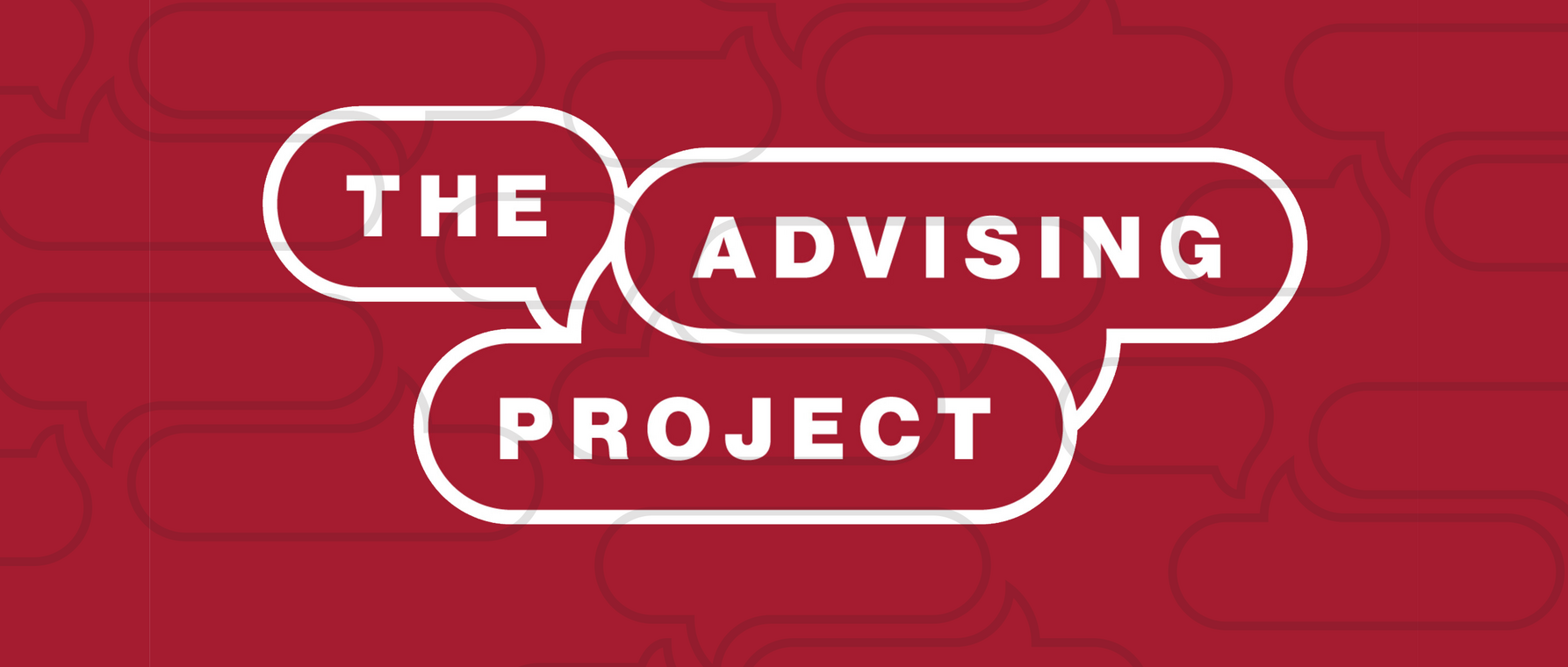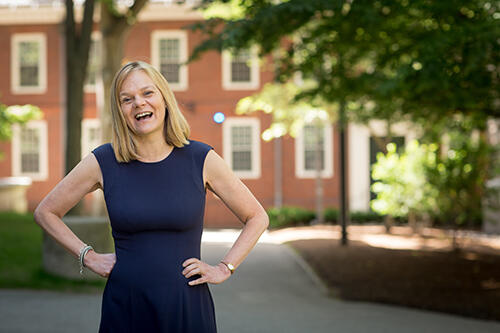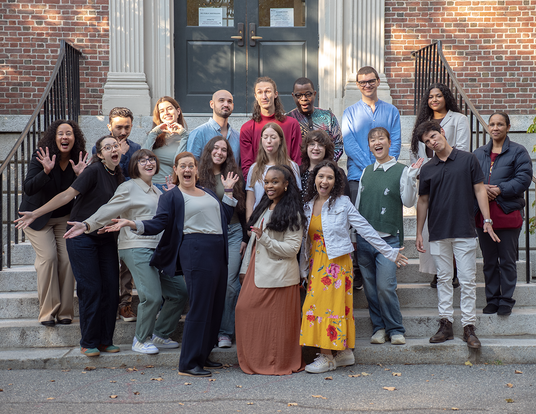Advising 2.0
With new leadership and an increased focus on the impact of advisors, The Advising Project looks to enhance the overall academic experience for students

Released in the fall of 2023, the Report of the GSAS Admissions and Graduate Education (GAGE) Working Group affirmed the importance of advising for graduate student success and well-being. While students often express satisfaction with their advisors on annual exit surveys, the report noted that providing more structure and consistency in advising could make the relationship more effective and reduce student stress. Improving advising might also help lower the time to degree and increase students’ satisfaction with the PhD program.
“It’s stressful when expectations are unclear,” Emma Dench, dean of the Harvard Kenneth C. Griffin Graduate School of Arts and Sciences (GSAS) and working group chair, said after the report's publication. “As someone who was both a doctoral student and a faculty member, I know that it can feel harrowing for students when they don’t know if their advisor will respond in time for them to apply for a job or fellowship.”
To address these concerns, in 2019 Dench launched The Advising Project (TAP), which puts student success and well-being at the center of the advising relationship. Five years on, much has changed and TAP is entering a new phase, poised to increase its impact under the guidance of new assistant directors Katie Callam, PhD ’20, and Dr. Rogers Walker. Building on the groundwork laid by their predecessors, Callam and Walker bring a fresh perspective and renewed energy to TAP. With their deep commitment to improving the advising experience, they are ready to propel the project forward, reinforcing its core values while introducing new approaches to meet the needs of today’s faculty and the master’s and PhD students they advise.

As someone who was both a doctoral student and a faculty member, I know that it can feel harrowing for students when they don’t know if their advisor will respond in time for them to apply for a job or fellowship.
— Emma Dench, Dean of Harvard Griffin GSAS
Skill Building
Following parameters set by the GAGE report, TAP focuses on providing faculty access to training and other resources to help them develop their advising repertoire. One of TAP’s core offerings is a series of workshops designed to enhance advising experience and practice. As part of the strategy to promote active engagement and communication, TAP workshops reflect the project's core philosophy that effective advising involves clear, open dialogue and mutual understanding.
“For faculty, we will be offering workshops that focus on best practices in mentoring and ways to foster an inclusive advising environment,” notes Walker, TAP’s new assistant director of advising education. “We understand that faculty are at the forefront of guiding students, and we want to equip them with the tools and knowledge to make these relationships as productive and supportive as possible.”
As the new director of advising research, Callam has been instrumental in developing the TAP website’s materials for faculty advisers. She says the resources emphasize “skill building.”
“The faculty-student advising relationship is at the core of the graduate school experience, and yet advising has traditionally been something just ‘figured out,’ and not explicitly learned,” she says. “Our resources are meant to show that successful advising draws on a set of skills that can be practiced and developed little by little.”
TAP draws on the curriculum and training of the Center for Improvement of Mentored Experiences in Research (CIMER). Based at the University of Wisconsin-Madison, CIMER’s mission is “To improve mentoring relationships for research trainees and mentors at all career stages through the development, implementation, and study of evidence-based and culturally responsive interventions and the study of the mentoring ecosystem.” While the original CIMER curriculum is geared toward the sciences, TAP has also expanded to include the humanities and social sciences.
As assistant director of advising education, Rogers Walker will run workshops that draw on CIMER but are tailored to the Harvard community. “We’re looking to partner with departments to understand their specific needs, time constraints and schedule, and the most appropriate topics for their faculty and students,” Walker says.
Callam adds that TAP programming is not intended to mandate a set of strict advising rules across programs, but to draw on each advisor’s unique strengths and preferences. “We recognize that there is no one-size-fits-all approach to advising,” she says. “But research shows that successful advising relationships do have several through-lines, including strong communication and clear expectations. We want to highlight these areas so advisors can reflect on how they might look in their own practice.”
A Reciprocal Relationship
Dench says one of the main goals of The Advising Project is to transform advising into a dynamic, reciprocal relationship that benefits both faculty and students. “Our organizing concept is that effective advising hinges both on guidance and support from mentors and empowering students to actively engage in their own advising relationships.”
Callam says that, as they do for faculty, TAP will also offer student workshops that build skills for effective communication and advocacy in advising relationships.
Research shows that successful advising relationships do have several through-lines, including strong communication and clear expectations. We want to highlight these areas so advisors can reflect on how they might look in their own practice.
— Katie Callam, Assistant Director of The Advising Project
“We want to help students feel more confident in articulating their needs and clarifying what they expect from their advising relationships,” she says. “Faculty have a lot of responsibility in the advising relationship, but students also need to remember that advisors aren’t mind-readers. If something needs to change, even if it feels hard or awkward, they need to ask for it.”
Walker adds that, while faculty provide crucial guidance, students also have a significant role in shaping their advising experiences. “It’s a two-way street,” he says. One important way that students can take control of their mentoring relationships is by building an ‘advising village.’
“An advising village is not just about having a single mentor but about leveraging a network of advisors, peers, and resources that enrich a student’s academic journey,” he says. “It can bring different perspectives to a student’s academic work and, in so doing, dilute the power differential that can be one of the great challenges of the advising relationship.”
Aligning Expectations
One goal for TAP in the coming year is to encourage the use of “advising agreements” by advisors and advisees across disciplines. An advising agreement, sometimes called an advising contract or compact, is a written document that lays out the parameters for an advising relationship, covering topics such as communication, feedback, professional development, and authorship.
“Having misaligned expectations can be a huge source of dissatisfaction in advising relationships,” says Callam. “Whether that’s an advisor who wants their lab members in-person five days a week when a student wants to work from home, or a student who is waiting for their advisor to ask how their chapter is going while their advisor is waiting to be contacted, if one party is in the dark about what another is looking for, conflict and frustration can arise quickly. Using an advising agreement can help to prevent this kind of misunderstanding.”
Walker adds, “We want to ensure that all students, regardless of their identities, have access to the support they need. This includes not only helping them navigate the advising process but also ensuring that they feel valued and understood within the academic community.”
Toward a Culture of Advising
As The Advising Project moves into its next phase, Callam and Walker are eager to build on the successes of the past and explore new ways to enhance the advising experience for the Harvard Griffin GSAS community.
“We’re excited about the potential to have a meaningful impact,” Walker says. “The project has already made significant strides in improving advising across Harvard Griffin GSAS, and we believe there’s even more we can achieve. Our focus is on continuing to support faculty and students in creating strong, effective advising relationships.”
Waker portrays The Advising Project as a living, evolving initiative. He and Callam are committed to listening to feedback, adapting their approaches, and continually finding new ways to improve the advising experience and make real Dean Dench’s vision of a culture of advising.
“Graduate education is dynamic, particularly at Harvard Griffin GSAS,” he says. “Through all the changes, advising remains a pillar of support, guidance, and growth. Like Dean Dench, Katie and I are devoted to creating an environment where faculty advisers and students both thrive.”
Get the Latest Updates
Join Our Newsletter
Subscribe to Colloquy Podcast
Simplecast





